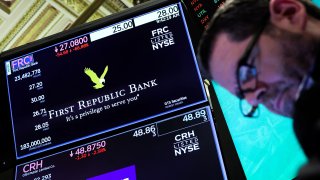
A trader works at the post where First Republic Bank is traded on the floor of the New York Stock Exchange (NYSE) in New York City, U.S., March 13, 2023.
- S&P cut its credit rating on First Republic to B+ from BB+ on Sunday after first lowering it to junk status just last week.
- The rating remains on CreditWatch Negative, said S&P.
- First Republic shares are down sharply this month as the collapse of Silicon Valley Bank caused investors to rethink other banks with large uninsured deposit bases.
Shares of First Republic Bank, which have become the barometer of the regional bank crisis, slid once again Monday after Standard & Poor's cut the credit rating of the San Francisco-based institution, but shares of rival banks were moving higher.
S&P reduced its credit rating for First Republic to B+ from BB+ on Sunday after first lowering it to junk status just last week. The rating remains on CreditWatch Negative, said S&P.
The stock fell 47% on Monday, extending its month-to-date decline to 90% as the collapse of Silicon Valley Bank has caused investors to rethink other banks with large uninsured deposit bases.
Get South Florida local news, weather forecasts and entertainment stories to your inbox. Sign up for NBC South Florida newsletters.
The stock extended its losses after the Wall Street Journal reported that JPMorgan CEO Jamie Dimon was involved in efforts for more help for First Republic. CNBC's David Faber reported that JPMorgan is advising First Republic on a potential capital raise.
Shares of First Republic were halted multiple times throughout the day for volatility.
Despite First Republic's decline, the SPDR S&P Regional Banking ETF gained 1.2% on Monday. PacWest Bancorp jumped 10.8%, while KeyCorp and Zions Bancorp enjoyed modest gains.
Money Report
And shares of New York Community Bancorp, which agreed to buy shuttered Signature Bank over the weekend, jumped more than 31%.
On Thursday, a group of major banks agreed to deposit $30 billion in First Republic to shore up confidence in regional banks. But the bank also suspended its dividend and said it had just about $34 billion in cash through March 15, not counting the new deposits.
"The deposit infusion from 11 U.S. banks, the company's disclosure that borrowings from the Fed range from $20 billion to $109 billion and borrowings from the Federal Home Loan Bank (FHLB) increased by $10 billion, and the suspension of its common stock dividend collectively lead us to the view that the bank was likely under high liquidity stress with substantial deposit outflows over the past week," stated S&P in its note Sunday.
First Republic could see further moves to shore up its balance sheet, including a potential sales. CNBC's David Faber reported on Monday that First Republic has hired an investment bank to advise it on potential options. However, a large hole in the bank's balance sheet caused by deposit outflows and the decline of long-term bonds and mortgages is a hurdle for the deal and no serious bidders have yet emerged, sources familiar with the situation told Faber.
In Europe, UBS bought Credit Suisse over the weekend in a forced tie-up facilitated by Swiss regulators to stop the banking crisis from spreading globally. Credit Suisse executives noted that the U.S. regional bank turmoil caused enough instability that forced the already shaky institution to merge with its rival.